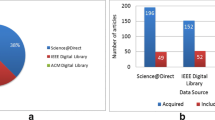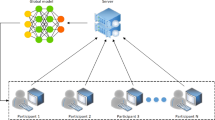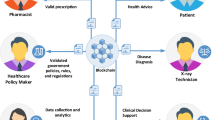Abstract
Federated learning is becoming a practical solution for machine learning (ML) in industry. This is due to the possibility of implementing artificial intelligence (AI) systems and training its models on private data sets. However, this is not an ideal solution as it is possible to manipulate or even intercept the model during its transmission between the server and workers. In this paper, we propose a solution to ensure the security of the model transmitted between units in FL. The given model is encrypted with AES, DES, RSA algorithms, then a checksum is determined. This checksum with a private key is stored as a transaction on a blockchain. In the case of sending the model and its modification, the recipient can easily verify whether it is correct. The proposed solution has been described, tested, and compared to indicate its advantages and disadvantages. Conducted experiments were based on analyzing the communication time between participants, the accuracy of machine learning models, and attack detection. In terms of attack detection on the blockchain, we reached 81% thanks to the checksum mechanism.




Similar content being viewed by others
Data availibility
Data is available on request from the authors.
Code availability
Code available on request from the authors.
References
Aïvodji UM, Gambs S, Martin A (2019) Iotfla: a secured and privacy-preserving smart home architecture implementing federated learning. In: 2019 IEEE Security and Privacy Workshops (SPW), IEEE, pp 175–180
Blanco-Justicia A, Domingo-Ferrer J, Martínez S, Sánchez D, Flanagan A, Tan KE (2021) Achieving security and privacy in federated learning systems: survey, research challenges and future directions. Eng Appl Artif Intell 106:104468
Chen L, Qingxiao F, Yi M, Zeng L, Rezaeibagha F, Hwang M-S (2022) Blockchain-based random auditor committee for integrity verification. Future Gener Comput Syst 131:183–193
Cheng K, Fan T, Jin Y, Liu Y, Chen T, Papadopoulos D, Qiang Y (2021) A lossless federated learning framework. IEEE Intelligent Systems, Secureboost
Guowen X, Li H, Liu S, Yang K, Lin X (2019) Verifynet: secure and verifiable federated learning. IEEE Trans Inf Forensics Secur 15:911–926
Huo R, Zeng S, Wang Z, Shang J, Chen W, Huang T, Wang S, Yu FR, Liu Y (2022) A comprehensive survey on blockchain in industrial internet of things: motivations, research progresses, and future challenges. IEEE Commun Surv Tutor. https://doi.org/10.1109/COMST.2022.3141490
Hyla T, Pejaś J (2020) Long-term verification of signatures based on a blockchain. Comput Electr Eng 81:106523
Jiang JC, Kantarci B, Oktug S, Soyata T (2020) Federated learning in smart city sensing: challenges and opportunities. Sensors 20(21):6230
Jiwei MZ, Bhuiyan ZA, Yang X, Singh AK, Frank Hsu D, Luo E (2021) Trustworthy target tracking with collaborative deep reinforcement learning in edgeai-aided IoT. IEEE Trans Ind Inf 18(2):1301–1309
Krizhevsky A, Ilya S, Hinton GE (2012) Imagenet classification with deep convolutional neural networks. Adv Neural Inf Process Syst 60:1097–1105
Li L, Fan Y, Tse M, Lin K-Y (2020) A review of applications in federated learning. Comput Ind Eng 149:106854
Lv Z, Han Y, Singh AK, Manogaran G, Lv H (2020) Trustworthiness in industrial IoT systems based on artificial intelligence. IEEE Trans Ind Inf 17(2):1496–1504
Ma C, Li J, Ding M, Yang HH, Shu F, Quek TQS, Vincent Poor H (2020) On safeguarding privacy and security in the framework of federated learning. IEEE Netw 34(4):242–248
Mothukuri V, Khare P, Parizi RM, Pouriyeh S, Dehghantanha A, Srivastava G (2021) Federated-learning-based anomaly detection for IoT security attacks. IEEE Internet Things J 9(4):2545–54
Mothukuri V, Parizi RM, Pouriyeh S, Huang Y, Dehghantanha A, Srivastava G (2021) A survey on security and privacy of federated learning. Future Gener Comput Syst 115:619–640
Natani A, Sharma A, Perumal T (2021) Sequential neural networks for multi-resident activity recognition in ambient sensing smart homes. Appl Intell 51(8):6014–28
Sater RA, Ben Hamza A (2021) A federated learning approach to anomaly detection in smart buildings. ACM Trans Internet Things 2(4):1–23
Simonyan K, Zisserman A (2014) Very deep convolutional networks for large-scale image recognition. In: 3rd International Conference on Learning Representations, ICLR 2015, San Diego, CA, USA, May 7-9, 2015, Conference Track Proceedings
Szegedy C, Vanhoucke V, Ioffe S, Shlens J, Wojna Z (2016) Rethinking the inception architecture for computer vision. In:Proceedings of the IEEE conference on computer vision and pattern recognition, pp 2818–2826
Truex S, Baracaldo N, Anwar A, Steinke T, Ludwig H, Zhang R, Zhou Y (2019) A hybrid approach to privacy-preserving federated learning. In: Proceedings of the 12th ACM Workshop on Artificial Intelligence and Security, pp 1–11
Tschandl P (2018) The HAM10000 dataset, a large collection of multi-source dermatoscopic images of common pigmented skin lesions. Sci Data. https://doi.org/10.7910/DVN/DBW86T
Wawrzyniak N, Zaniewicz G (2016) Detecting small moving underwater objects using scanning sonar in waterside surveillance and complex security solutions. In: 2016 17th International Radar Symposium (IRS), IEEE, pp 1–5
Xu Y, Bhuiyan MZA, Wang T, Zhou X, Singh A (2022) C-fdrl: context-aware privacy-preserving offloading through federated deep reinforcement learning in cloud-enabled IoT. IEEE Trans Ind Inform. https://doi.org/10.1109/TII.2022.3149335
Yang Q, Liu Y, Chen T, Tong Y (2019) Federated machine learning: concept and applications. ACM Trans Intell Syst Technol (TIST) 10(2):1–19
Yunlong L, Huang X, Dai Y, Maharjan S, Zhang Y (2019) Blockchain and federated learning for privacy-preserved data sharing in industrial IoT. IEEE Trans Ind Inf 16(6):4177–4186
Zellinger W, Wieser V, Kumar M, Brunner D, Shepeleva N, Gálvez R, Langer J, Fischer L, Moser B (2021) Beyond federated learning: on confidentiality-critical machine learning applications in industry. Proced Comput Sci 180:734–743
Zhang G, Zhang X, Bilal M, Dou W, Xu X, Rodrigues JJ (2022) Identifying fraud in medical insurance based on blockchain and deep learning. Future Gener Comput Syst 130:140–54
Zhou C, Anmin F, Shui Yu, Yang W, Wang H, Zhang Y (2020) Privacy-preserving federated learning in fog computing. IEEE Internet Things J 7(11):10782–10793
Acknowledgements
This work is supported by the Rector proquality grant at the Silesian University of Technology, Poland No. 09/010/RGJ22/0067.
Funding
This article received no funding from external sources.
Author information
Authors and Affiliations
Contributions
KP: Conceptualization, Methodology, Software, Data curation, Validation, Investigation, Visualization, Writing-original draft. DP: Conceptualization, Methodology, Data curation, Validation, Investigation, Writing-review and editing. GS: Methodology, Validation, Writing-review and editing. JC-WL: Methodology, Writing-review and editing.
Corresponding author
Ethics declarations
Conflict of interest
The authors have no Conflicts of Interest to declare for this manuscript.
Additional information
Publisher's Note
Springer Nature remains neutral with regard to jurisdictional claims in published maps and institutional affiliations.
Rights and permissions
Springer Nature or its licensor holds exclusive rights to this article under a publishing agreement with the author(s) or other rightsholder(s); author self-archiving of the accepted manuscript version of this article is solely governed by the terms of such publishing agreement and applicable law.
About this article
Cite this article
Prokop, K., Połap, D., Srivastava, G. et al. Blockchain-based federated learning with checksums to increase security in Internet of Things solutions. J Ambient Intell Human Comput 14, 4685–4694 (2023). https://doi.org/10.1007/s12652-022-04372-0
Received:
Accepted:
Published:
Issue Date:
DOI: https://doi.org/10.1007/s12652-022-04372-0




